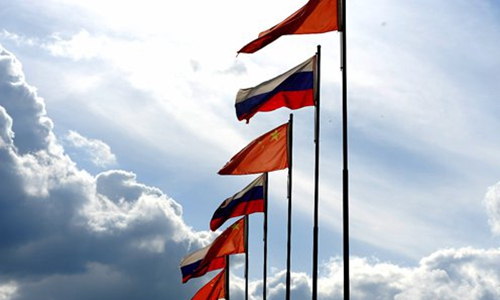HOME >> OPINION
US could determine unlikely ‘China-Russia alliance’
By Ling Shengli Source:Global Times Published: 2019/12/12 20:13:40

Photo: IC
Earlier this month, US magazine The National Interest published an article entitled "Donald Trump's Greatest National Security Threat: A China-Russia Alliance."This statement doesn't come as a surprise since Polish-American political scientist Zbigniew Brzezinski suggested two decades ago in his book The Grand Chessboard that the US should stay vigilant about the alliance of rival countries in Eurasia. The alliance that Brzezinski pointed out, more specifically, was the possible alliance between China and Russia.
US political scientist Samuel Huntington also expressed his concern about the probable alliance among Islamic civilization, Orthodox civilization and Confucian civilization in his book The Clash of Civilizations.
Since Trump took office, he has been emphasizing superpower competition. In his first National Security Strategy, issued in 2017, China and Russia have already been listed as "revisionist powers" and "challengers" to the US. So, is it well-reasoned that the perceived China-Russia alliance is becoming the biggest national security threat to the US? Is the so-called alliance a real nightmare or a figment of imagination of the US?
There have been ups and downs in China-Russia relations over the past seven decades. For quite a long time, Western countries have been speculating about a possible establishment of an alliance between China and Russia. However, both Beijing and Moscow have already declared multiple times that their relations are a partnership rather than an alliance. There is no way back to the China-Soviet Union alliance in the Cold War era.
Based on history and the current international situation, China and Russia have pioneered a new type of relationship featuring non-alliance, non-confrontation and non-targeting at any third party. Although there is close cooperation between the two countries in many fields, such as politics, economy, security and culture, they are partners instead of allies, which the leaders of both countries have made clear.
Fu Ying, chairperson of the Foreign Affairs Committee of China's National People's Congress, wrote in US magazine Foreign Affairs in 2016 that "China has no interest in a formal alliance with Russia, nor in an anti-US or anti-Western bloc of any kind. Rather, Beijing hopes that the two neighbors can maintain their relations in a way that will provide a safe environment for the two countries to achieve their development goals and to support each other through mutually beneficial cooperation, offering a model for how major countries can manage their differences and cooperate in ways that strengthen the international system."
Military alliance is an important form of international security cooperation. Yet its drawbacks have been exposed after the Cold War. The existing military alliances, especially those of the US, are mostly the remnants of the Cold War. There are very few new alliances formed among other countries after the period, which mirrors that military alliances are no longer compatible with the needs of the times. Forming an alliance will weaken the strategic autonomy of both China and Russia.
Security cooperation is one of the components in relations among countries. Close national security cooperation does not equal a military alliance. Nowadays, the security cooperation between China and Russia deals with the conventional and unconventional security threats, protecting the two countries, the regions they are in as well as the world. In fact, China also has close security cooperation with many other countries, such as Pakistan and Kazakhstan, but the country has also articulated those bilateral relations as featuring non-alliance and non-targeting at any third party.
Currently, the world is generally peaceful and stable. Yet conventional and unconventional security threats are entangled. No country can cope with them alone. Moreover, unconventional threats are spreading in a borderless way, which makes military alliance of no use.
Thus, security cooperation is a viable solution. The reason why China follows the non-alignment policy, promotes partnership rather than alliance, is to embrace the new type of security cooperation rather than the traditional military alliance. Moscow also sees the partnership with Beijing as the best option for itself. The two have also learned a lesson from their previous alliance.
China, the US and Russia are regarded as the three most important forces in international arena. If there will be an alliance between China and Russia, it will definitely trigger a chain reaction in relations among the trio, which could possibly increase military tensions and do more harm than good.
On the whole, forming alliances is a strategy based on self-interest and mutual interest. But it is not a wise choice for both China and Russia in the foreseeable future. The US definitely does not want to see an alliance between its "challengers," which can be a huge threat to its hegemony. Even though the US is well aware that China and Russia will not form any alliance in the near future, it still tends to hype up such speculation due to its pursuit of absolute security.
With increasing global uncertainty and instability, the international order is facing more challenges. Intensifying collaboration between China and Russia is a response to US unilateralism, as it is gradually damaging the international system.
In other words, whether an alliance between China and Russia alliance would be formed some day in the future, though it is unlikely now, could depend heavily on the US.
The author is secretary-general of the International Security Study Center at China Foreign Affairs University. opinion@globaltimes.com.cn
RELATED ARTICLES:
Posted in: VIEWPOINT